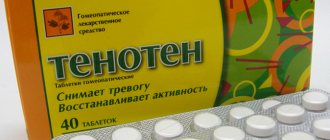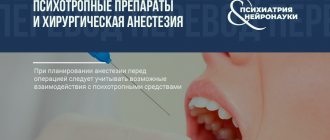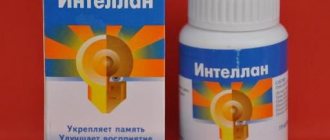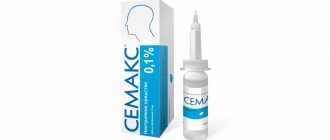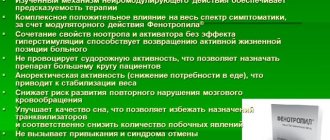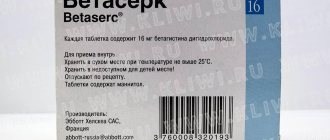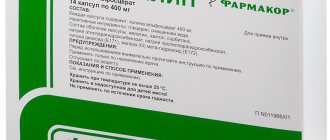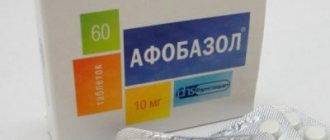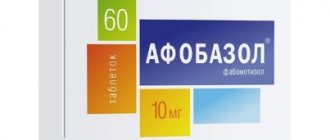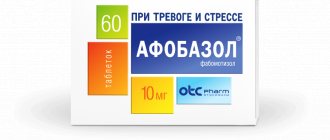The crazy pace of life provokes stress and nervous conditions. To calm down, eliminate anxiety and normalize sleep, doctors recommend taking sedatives. A good calming effect can be achieved by taking Persen or Tenoten.
To calm down, eliminate anxiety and normalize sleep, doctors recommend taking Persen or Tenoten.
Comparison of the effects of anxiolytics
The difference between Tenoten and Afobazole lies in their composition and differences in their effect on the body. The first drug has a combined effect and belongs to two groups at once: neurometabolic stimulants (nootropics) and anti-anxiety drugs. Afobazole refers only to anxiolytics. Therefore, these drugs match in the ATC only by one code: N05BX.
Comparison table of indications for the use of anxiolytics Afobazole and Tenoten:
| Nosology | Disease code according to ICD-10 | Afobazole | Tenoten for children | Tenoten | Explanation of nosology |
| Somatic manifestations of diseases with anxiety | ― | V | The appearance of anxiety in asthma, COPD, lupus, cardiac ischemia or arrhythmia, hypertension, irritable bowel syndrome, and other somatic pathologies. | ||
| Asthenic disorder | F06.6 | V | |||
| Personality and behavioral disorder | F07 | V | |||
| Somatoform disorder | F45.9 | V | |||
| Withdrawal state | F10.3, F17.3 | V | Disorder caused by alcohol consumption or smoking (hangover syndrome, nicotine withdrawal). | ||
| Anxiety disorder | F41.1, F41.9 | V | V | V | Generalized or unspecified disorder (phobic neurosis, panic attacks, anxiety states). |
| Anxiety-depressive disorder | F41.2 | V | Signs of a mixed type of disorder. | ||
| Reaction to stress or related adjustment disorder | F43.0―F43.9 | V | V | Consequences of stress and depression. | |
| Neurasthenia | F48.0 | V | V | V | |
| Other NS disorders | V | V | Psycho-emotional stress. | ||
| Fluctuating Personality Disorder | F60.3 | V | |||
| Violation of attention, behavior, activity | F90.0, F91 | V | Depression, school neurosis or with lethargy, lack of attention, hyperactivity syndrome. | ||
| Kleine-Levin syndrome | G47.8 | V | A disease in which a person sleeps more than 18 hours a day. | ||
| Autonomic nervous system disorders | G90.0―G90.9 | V | V | V | VSD and other types of dystonia, vegetative lability. |
| Cerebrovascular disease and its consequences | I67.9, I69 | V | Impaired blood circulation in the brain, hypoxia, vascular changes. | ||
| Cognitive and psychoemotional disorders | R41.3.0, R45.0–45.4 | V | V | Irritation, apathy, nervousness, memory impairment, demoralization, anxiety, anger, emotional agitation. | |
| Emotional disorder in children | F93.9 | V | Neurotic syndrome. | ||
| PMS | N94.3 | V | Deterioration of psycho-emotional mood due to a change in the phase of the cycle. | ||
| Violation of adaptation to changes in lifestyle | Z60.0 | Jet lag or adaptation to a new job, after moving, and so on. | |||
| Injuries and their consequences | T14, T90, S06 | V | Unspecified or intracranial injury. |
Note: in practice, doctors prescribe Afobazole for the same cognitive and neurotic disorders as Tenoten. The drug with fabomotizole normalizes the psycho-emotional state in 2/3 of patients, improves memory and concentration.
Brief description of Tenoten
Tenoten is a homeopathic drug with anxiolytic and nootropic effects. Produced in the form of lozenges. The main component of the composition are antibodies to the brain-specific protein S-100 in a dosage of 3 mg or its active form in a volume of 10-15 nanograms/gram. The excipients are 0.03 g MCC, 0.003 g magnesium stearate and 0.267 g lactose.
Therapeutic properties of Tenoten:
- anti-amnestic (improves memory);
- nootropic (normalizes metabolism in the brain);
- neuroprotective (restores the structure of nerve cells);
- anti-stress and antidepressant (increases the endurance of the nervous system to irritants);
- anti-anxiety;
- anti-asthenic (restores the functions of exhausted neurons);
- antihypoxic (eliminates the effects of oxygen starvation of cells).
Two types of medicine have been developed - “Tenoten for children” and for the treatment of adults. But when comparing instructions, the drugs do not differ in composition or dosage of active and excipients. A direct (structural) analogue is Proproten-100, Antibodies to brainspecific protein S-100, Antibodies to brainspecific protein S-100.
Brief description of Afobazole
Afobazole is a tranquilizer with anti-anxiety and neuroprotective effects. It is produced in the form of uncoated tablets for oral use. The active substance is fabomotizole (fabomotizol), dosage 5 mg, 10 mg. The auxiliary components are 0.048 g of potato starch, 0.04 g of MCC, 0.0485 g of lactose, 0.007 g of medium molecular povidone, 0.0015 g of magnesium stearate.
Therapeutic properties of Afobazole:
- reduces concern, irritability, anxiety (anxiolytic effect);
- relieves psycho-emotional or nervous tension (normalizes mood, promotes relaxation, eliminates insomnia);
- removes somatic symptoms;
- eliminates disorders of the autonomic nervous system (eliminates vertigo, dry mouth, sweating);
- improves memory (anti-amnestic) and concentration;
- normalizes the condition of asthenic manifestations of a personal nature.
Afobazole is used only in the treatment of adult patients over 18 years of age. A structural analogue is the concentrate for infusion Neurofazol.
Comparison of contraindications and side effects of anxiolytics
Children's Tenoten should not be given to a child under 3 years of age . The list of other restrictions is identical to contraindications for adults.
Afobazole or Tenoten for adults should not be prescribed to patients under 18 years of age, during pregnancy, hypersensitivity to the composition of drugs, galactose intolerance, lactase deficiency, monosaccharide malabsorption syndrome. Lactating women are allowed to take the drug only after transferring the child to artificial nutrition. Breastfeeding is resumed two weeks after completing the course of Afobazol or Tenoten.
Both drugs can cause a rash or other allergies. Afobazole differs from Tenoten in other side effects. Treatment with fabomotizole rarely causes cephalalgia (headache). This reaction to Afobazole disappears on its own on days 1–5 of therapy. After taking Tenoten, double vision may occur. Vision recovers on its own within 10 minutes.
Patient reviews
Alina. Afobazole made me very sleepy. Every day I went to bed at four in the evening. But I didn’t notice any calming of anxiety from him. There was no sleepy reaction from Tenoten. Although it didn’t bring much peace either.
Lesya. Teneten helps me. Of course, nothing happened from one pill. I take it regularly. And for the first time I began to sleep peacefully. The nightmares stopped tormenting me.
Marina. I went through a lot of stress. I tried a number of tranquilizers. I also took Afobazole, but it only made my anxiety worse. And, in my opinion, it still causes addiction.
Margot. Tenoten are great wheels. Excellent calming effect. I drank it on purpose, I wanted to watch a horror movie properly. I watched the film with interest, without unnecessary anxiety and emotions.
Advantages and disadvantages of anxiolytics
Neither Tenoten nor Afobazole cause addiction to their action , dependence or syndrome due to drug withdrawal. The advantages include safety, absence of hepatotoxicity, rare occurrence of adverse reactions, and a high percentage of patients’ body response to treatment. The advantages include the possibility of long-term continuous use: Afobazole is allowed to be taken for 3 months, and Tenoten for six months.
The disadvantages of the drugs include being advertised, high exchange rates, and more than 20% of cases of treatment failure. Questions among doctors are raised by the lack of evidence base (suspicion of a placebo effect) and insufficient description of side effects. Many therapy and pediatric patients complain of weight gain, increased severity of excitability, irritation, insomnia, including those caused by other medications, although such effects are not indicated in the instructions for Afobazole, Tenoten.
Comparison of addiction between Persen and Tenoten
Like safety, addiction also involves many factors that must be considered when evaluating a drug.
Thus, the totality of the values of such parameters as “o syndrome” in Persen is quite similar to the similar values in Tenoten. Withdrawal syndrome is a pathological condition that occurs after the cessation of intake of addictive or dependent substances into the body. And resistance is understood as initial immunity to a drug; in this it differs from addiction, when immunity to a drug develops over a certain period of time. The presence of resistance can only be stated if an attempt has been made to increase the dose of the drug to the maximum possible. At the same time, in Persen the meaning of the “syndrome” is quite small, however, the same as in Tenoten.
Comparison of clinical trial results
You can also compare Afobazol and Tenoten based on the results of testing of these products by the developers . Fabomotizol acts on Σ1 R (sigma receptors) in the brain, stimulates neurons and increases their energy potential. This complex effect of Afobazole restores the sensitivity of nerve cells to inhibitory neurotransmitters of the central nervous system, which makes it possible to relieve tension in the nervous system. If dosages of 30–60 mg/day are observed, a person does not develop sedation (drowsiness) and can safely drive vehicles or operate machinery.
Afobazole research results:
- within an hour after ingestion, it reaches the peripheral areas of the body in the blood;
- eliminated from the body in 34–160 minutes;
- Patients noted the first effect after five days of treatment at a dose of 30 mg per day;
- after therapy, the anti-anxiety effect of Afobazole lasts up to 14 days;
- in case of overdose, drowsiness appears;
- in 70% of patients participating in testing, a lasting effect occurred after 4 weeks of use.
WHO specialists studied the pharmacological action and safety of Afobazole for the body. Based on the test results, they decided to include the substance in the ATX directory and assigned it a separate code N05BX “fabomotizole”. Therefore, since 2015, Afobazol officially belongs to the anxiolytics and is used according to the protocol for the treatment of psychoneurological disorders.
Tenoten's substance improves the activity of the S-100 protein in the brain, which normalizes the information process, metabolism in its tissues, and increases neuronal plasticity. Research was carried out only by the developers of the drug at the scientific center V.P. Serbian. Over the course of a month, 80 people over 18 years of age were tested, with the exception of pregnant and lactating women. The report on effectiveness and tolerability was compiled in 2004 based on a patient survey about side effects and comparison of weekly records on the Hamilton, HAM-A, STAI, SAN scales.
Tenoten testing results:
- the sedative effect became noticeable after 2 weeks of treatment;
- when consumed less than 2 hours before bedtime, the process of falling asleep worsens;
- 5 patients experienced adverse reactions, including lack of effect;
- 75% of those taking the drug had no anxiety by the end of 28 days.
The documents and Tenoten were not handed over to WHO experts, so there are no full testing results according to their standards. The active substance “antibodies to the brain-specific protein S-100” was not assigned a separate code in the ATC; drugs containing it are not first-line drugs; treatment with Tenoten alone is not recommended.
Evaluating effectiveness when choosing a product
When treating diseases with anxiety, it is better for an adult to take Afobazole than Tenoten . The effect and safety of fabomotizole was studied by developers, clinicians and WHO experts. It is compatible with ethanol, increases the anticonvulsant property of anticonvulsants, which allows it to be successfully used for alcohol withdrawal. The active substance Afobazole gently eliminates the manifestations of somatic diseases of the duodenum, gastrointestinal tract, ganglia, and cardiovascular system. Tenoten is a homeopathic remedy with controversial therapeutic efficacy.
It is allowed to supplement the effect of medications with homeopathy in the treatment of anxiety caused by cerebrovascular accidents and to prevent its consequences. With long-term use, Tenoten will be more effective instead of Afobazole. But as a mono-drug it is used after drug therapy.
If we compare the stimulating effect of these anxiolytics, Tenoten will be stronger: its last dose should be no later than 120 minutes before bedtime. Afobazole is allowed to be taken at night, since it has a slight stimulating effect, and it is better to drink it for sleep disorders.
Reviews
What do patients say about the drugs?
"Afobazol"
“A minor effect appeared only after 2 weeks of use.”
“The drug is very good. It copes well with irritability, normalizes nighttime sleep and does not cause daytime sleepiness.”
“Only after taking it for two weeks did a weak effect begin to appear. The medicine is well tolerated. You will have to wait a very long time for calm, so I do not recommend the drug. There are much better means."
"Tenoten"
“I think that all homeopathy is a dummy. I tried a lot of these remedies, but I didn’t notice any results.”
“I gave Tenoten to a child. The son disobeyed at school and argued with classmates and teachers. After treatment with this remedy, I became much calmer and my academic performance improved.”
Reviews from neurologists
"Afobazol"
“There is no point in taking Afobazol as a separate remedy. The effect can only occur in combination with other sedatives.”
“In combination with anticonvulsants, their dosage is reduced.”
“The main drawback is that it takes too long to get any effect.”
Combined use of anxiolytics
Medical statistics as of May 2021 did not record any negative reactions from the interaction of the anxiolytics in question with substances of other drugs. Therefore, treatment with Afobazol and Tenoten at the same time is allowed. The combined use of fabomotizol and antibodies to the S-100 protein expands their spectrum of action and enhances the anti-anxiety and sedative effect. It is most often used to treat long-term anxiety or severe memory or attention loss.
Attention: do not use Tenoten and Afobazole together! Tablets with fabomotizol are drunk no later than 40 minutes after eating three times a day. Tenoten is absorbed 1/4-1/2 hour before meals.
Comparison of the effectiveness of Persen and Tenoten
The effectiveness of Persen is quite similar to Tenoten - this means that the ability of the drug substance to provide the maximum possible effect is similar.
For example, if the therapeutic effect of Persen is more pronounced, then using Tenoten even in large doses will not achieve this effect.
Also, the speed of therapy - an indicator of the speed of therapeutic action - is approximately the same for Persen and Tenoten. And bioavailability, that is, the amount of a drug reaching its site of action in the body, is similar. The higher the bioavailability, the less it will be lost during absorption and use by the body.
Doctors' opinion
The similarities between Tenoten and Afobazole include their use in organic diseases of the nervous system, stress, and autonomic disorders. These drugs are advisable to use if dysfunction of the nervous system or the development of the disease is accompanied by anxiety, insomnia, memory impairment, emotional lability, dizziness and similar manifestations. In order for a calming effect to appear at the beginning of taking them, sedatives are additionally prescribed, for example, Novopassit.
The difference is that Tenoten belongs to homeopathic remedies, and Afobazole belongs to tranquilizers . A drug based on antibodies to the brain-specific protein S-100 can be used for preventive purposes. A medicine with fabomotizole is prescribed during treatment to eliminate anxiety and other consequences of nervous system disorders in people over 18 years of age.
According to reviews from neurologists and other doctors, for moderate disorders, Afobazole is more effective when used in combination with medications specified in the treatment protocol for the identified disease. Tenoten and other homeopathic remedies are used only for prevention or as an auxiliary drug in therapy. Its active substance enhances the effect of basic drugs.
Many doctors practice a combination of drug and alternative medicine treatments. They allow joint therapy with Tenoten and Afobazole, if the patient tolerates both substances well, the effectiveness of the drugs increases, and the anti-anxiety and sedative properties are enhanced.
It is useful to prescribe homeopathic medicines to people with anxious suspiciousness and susceptible to self-hypnosis. In the absence of a pathological factor, the placebo effect and the safety of such drugs are more important. In these cases, Tenoten will help if the dosages are observed.
The attending physician must tell you which drug to give preference to. Tenoten with Afobazole has recently been used in neurology and psychiatry. If they are used for other purposes, without prior examination, with a dosage that is inappropriate for the form of the disease, the pathology will be complicated by psychoneurotic and vegetative disorders.
Comparing the safety of Persen and Tenoten
The safety of a drug includes many factors.
At the same time, in Persen it is quite similar to Tenoten. It is important where the drug is metabolized: drugs are excreted from the body either unchanged or in the form of products of their biochemical transformations. Metabolism occurs spontaneously, but most often involves major organs such as the liver, kidneys, lungs, skin, brain and others. When assessing metabolism in Persen, as well as in Tenoten, we look at which organ is the metabolizing organ and how critical the effect on it is.
The risk-benefit ratio is when the prescription of a drug is undesirable, but justified under certain conditions and circumstances, with the obligatory observance of caution in use. At the same time, Persen does not have any risks when used, just like Tenoten.
Also, when calculating safety, it is taken into account whether only allergic reactions occur or possible dysfunction of the main organs. In other matters, as well as the reversibility of the consequences of using Persen and Tenoten.
